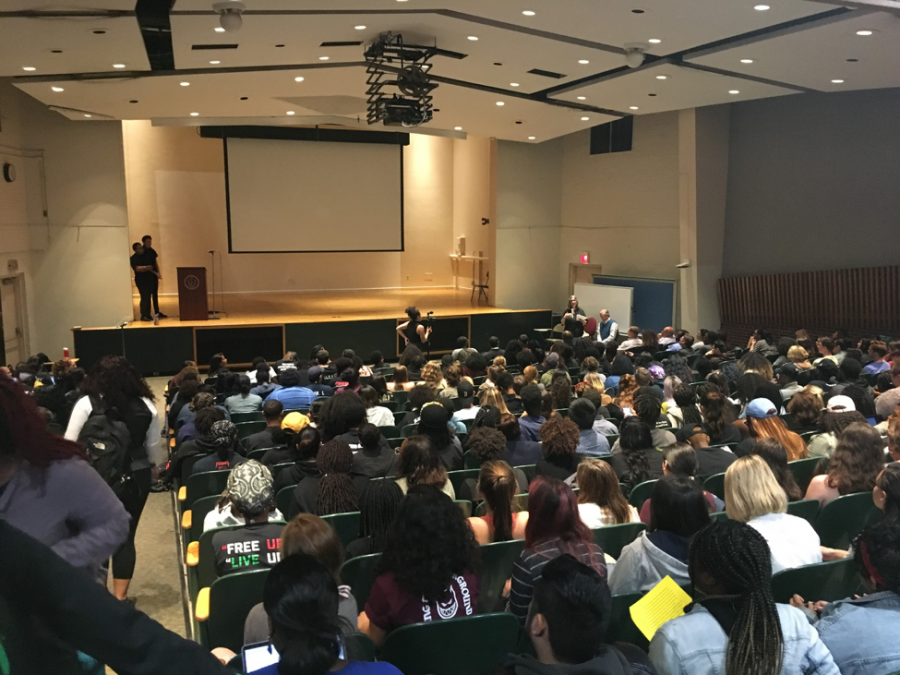In response to recent incidents of racial injustice at the University of Massachusetts, the Student Government Association held an emotional community forum in the Bartlett Hall auditorium on Thursday evening.
For over two hours, approximately 200 students gathered at the discussion, which was led and organized by SGA President Timmy Sullivan and SGA Vice President Nathalie Amazan’s administration. Also present, among others, were UMass Police Department Chief of Police and Assistant Vice Chancellor of Student Affairs Tyrone Parham and Cultural Council Vice President Leonor Ayala-Sanchez.
“We are here because of racial profiling in Whitmore, we are here because of the hate crime in Melville Hall,” Amazan said. “We are here because students, and students of color do not feel safe on this campus.”
The forum follows two racially-motivated incidents on campus. This past weekend, the written message “Hang Melville n******” was discovered in a bathroom in Melville Hall in Southwest Residential Area.
The second involved an anonymous tip earlier this month that was provided to UMPD alerting them about an “agitated black male” walking near the Whitmore Administration Building. The individual, however, was an employee walking to work.
“People say that we are in hard and trying times with our political climate, but we as students of color living in this country, living on this campus have always been in hard and trying times. This is not new. We are not trying to sugarcoat anything,” Amazan said.
After introductions by the SGA president and vice president, Ayala-Sanchez recounted her own experiences with racism on campus.
“I genuinely feel like I am not welcome and safe on this campus,” Ayala-Sanchez said.
“Silence is violence and we can no longer stay silent. It’s time for us as a community to improve this University. I want to make sure that it is good and better for others,” she added.
After Ayala-Sanchez’s remarks, Parham expressed his regret regarding the recent incidents on campus, but reiterated UMPD’s responsibility to protect the public and respond to threats that may or may not be credible.
“Immediately after, particularly the Whitmore situation, [we] realized once we got through the threat part of what was called into us, of what we thought was a substantial enough threat that we needed to confirm that there was no public safety issue, even though we thought this could be racial profiling, the way that description came in through Whitmore, we thought we owed an obligation to confirm it,” he said. “Once we confirmed it, I knew immediately there were going to be some challenges.”
In response to the Melville incident, Parham stated UMPD had launched an active investigation on the circumstances surrounding the racist message.
After Parham’s statement, students from Melville had a chance to speak. The University, they said, has an obligation to both rectify the situation and implement measures to prevent the occurrence of similar events in the future.
“We need to turn this energy into something good. We need to take action and make real change, but we cannot do this alone,” said Chimburuoma Ihunwo, a freshman sports management major who lives in Melville.
Along with their personal testimonies, the students presented a list of demands they wrote together addressed to the UMass administration. Some of those demands included having the University notify students about what happened, having mandatory meetings in dorm halls about racist hate speech and having mandatory online sensitivity training for students and faculty about racism.
“This was not a mistake. This was a racial death threat, this was a threat to the Melville community and to our lives,” Ihunwo said.
After the Melville students spoke, the forum broke into an open floor for students in the audience to share their experiences and feelings about the current campus climate.
Some students expressed the need for a cultural center located centrally on campus. Current spaces, such as the Malcolm X Cultural Center, are located in far-reaching areas of campus that aren’t accessible, they said.
At the end of the forum, Amazan explained she would go to the administration with Sullivan and present the sentiments and demands expressed.
“I’m really feeling the love and the sense of the community here,” Amazan said. “Justice cannot exist where love does not.”
Audience members were invited to attend the teach-in, “The Problem with the Color Line,” which will discuss the history of racism and racial profiling. The teach-in will be held on Oct. 2 at 5:00 p.m. in the Cape Cod Lounge in the Student Union.
Michael Connors can be reached at [email protected] or followed on Twitter @mikepconnors. Rithika Senthilkumar can be reached at [email protected].





















Amy • Sep 28, 2018 at 4:41 pm
Good the SGA is addressing racial injustice but who did they leave out?? Asians and Jews/ Asians are regularly discriminated at colleges including Umass; who prefers other ‘students of color’, and in fact many professors at this college have made adverse remarks denigrating Asians for preferring meritocracy and being ‘model minorities’.
Where is the racial injustice for jews on campus who have been a victim of anti-holocaust denial, and vandalism?
I think the SGA went in the right direction but they cannot be perceived as having legitimacy until they include -all- victims of racial injustice.